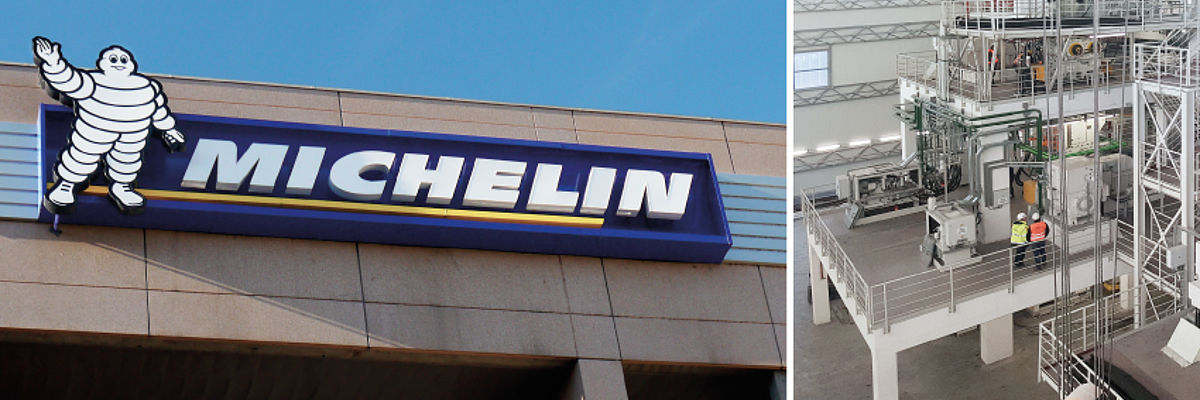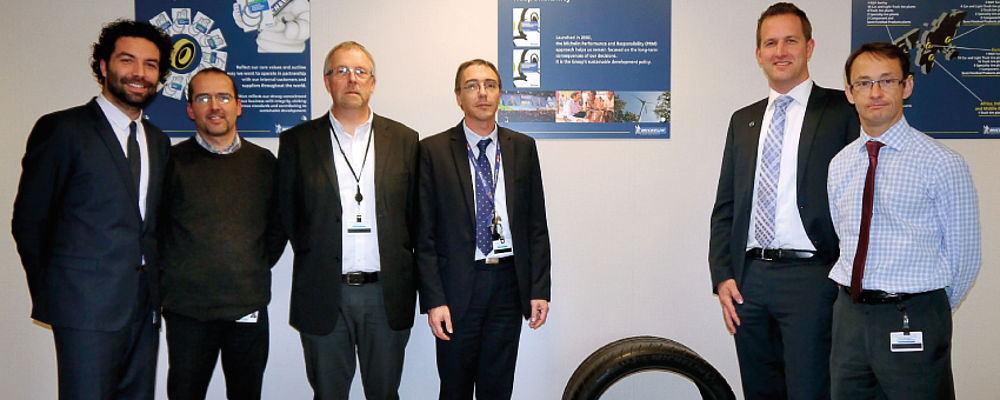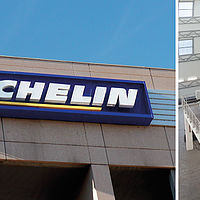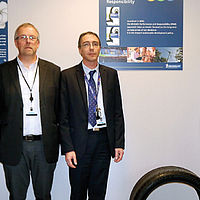A company like Michelin needs no big introduction. For more than a century now, the products of the French group have been a part of life in the western world – and increasing in the rest of the world, as well: Michelin maps, travel guides and route planners have accompanied generations of travellers. The Guide Michelin is considered the gold standard for chefs, hotel operators and gourmets. Everyone knows the Michelin Man; in 2000, it was even named the best trademark of all time.
And of course their core business is tyre manufacturing. With 69 production sites in 18 countries, sales offices in more than 170 countries, 180 million tyres produced each year, and an annual turnover of 19.2 billion euros (2014), Michelin is the world’s second-biggest tyre manufacturer, just behind their Japanese competitor Bridgestone. Founder Edouard Michelin laid the cornerstone of the company’s success in 1891 with the invention of the detachable pneumatic tyre, the predecessor of all of today’s tyres. Innovation has remained a part of the company to this day. Many technological breakthroughs originate from Michelin: the removable steel wheel (1913), the first low-pressure tyre for passenger cars (1923), the tyre with an inner tube incorporated by vulcanisation (1930), the zigzag profile (1930), the first steel-belted tyre with steel cords to reinforce the tyre (1938), the first tyre with a radial casing (1946), the TRX model, which united tyre and rim for the first time (1975) or the low rolling resistance “green” tyre (1992), just to mention the most important ones.
Along with its intensive research and development, Michelin is known for its advanced technology. Up until now, the company preferred to maintain direct control of this expertise: an army of in-house engineers developed and built the lion’s share of the machinery and plants needed. Anything that was not developed in-house was specified in minute detail for the suppliers. This same culture also characterised the business relationship between Michelin and HF Mixing Group dating back to 1907.
About-face in procurement
But now that is changing. Because Michelin is experiencing a minor cultural revolution: rising raw material costs and energy prices along with more expensive machines than the competition had recently resulted in increased stress on profit margins. A management consulting firm was called in to help. Besides the engineering area, they also took an especially close look at industrial procurement and made a number of recommendations for its optimisation. The consultants recommended to the Management, for example, to place greater trust in technologies from outside and to replace many of the in-house mechanical developments and production facilities by purchases. In that regard, greater emphasis should also be placed on the turnkey products of the manufacturers. In addition, the consultants suggested that Michelin’s Purchasing department should review the specification level, which was sometimes unnecessarily high.
Purchasing at Michelin wasted no time implementing the recommendations – at least with regard to their collaboration with HF MIXING GROUP. In February 2014, HF received the order to deliver two complete mixer lines for the new TIGAR tyre plant in Pirot, Serbia – a turnkey job including all necessary services such as construction supervision, scheduling, coordination of the trades on-site, etc. The only requirement that Michelin stipulated to HF in the technical specifications was the number of tyres of each type. HF then validated the corresponding mixing times for each type of tyre in extensive test runs at its own in-house technical centre. Subsequently, the engineering team developed the conceptual design for the complete TIGAR mixing room.
HF was well-prepared for the nearly 20-million-euro project – it had just completed its transformation from a pure machinery manufacturer to a system supplier. The hardware was delivered one full year after receipt of the order, and the installation was completed at the end of 2015. Acceptance was signed in early 2016.
Maurice Biegale, HF Sales Engineer for Michelin, took this occasion to travel to the company’s headquarters in Clermont-Ferrand to meet with the responsible parties for a final review of the TIGAR project and also to take stock of the new form of collaboration. The mere fact that five Michelin managers were willing to do this together with him shows just how much Michelin cares about supplier relationship management.
“With the TIGAR project, we were in uncharted waters. It was the first complete mixing room we’d bought in the history of the company”,
says Stephane E., who is responsible for suppliers and external solutions in the Corporate Development department.
“In the past, we always developed such lines ourselves and purchased the separate components – like the mixer bodies from HF – from our suppliers. In such projects, teams from several of our departments were involved, from Engineering to Purchasing to Automation and Maintenance.”
“The advantages of the new approach are obvious: the responsibility is clearly assigned, for us the contact and coordination with multiple suppliers is eliminated entirely, and we save internal resources”,
explains his colleague Olivier D., Category manager at the Purchasing Department.
“Previously we knew HF MIXING GROUP as a supplier of high-quality technology. Now with this project you have also proven your ability to supply turnkey solutions and to manage big projects. Our experience with you in this context encourages us to purchase more turnkey solutions from you in the future. But the success of such a project depends not only on the supplier, but also on the type of mixes. That’s why we concentrated on the Tier 3 segment first.”
“The premium mixes are more demanding”,
agrees Stéphane E.
“Although we want to rely on turnkey solutions more often now, the production of ultra-high-performance tyres usually forces us to make a lot of modifications, so turnkey doesn’t make sense here.”
Pierre F. from the Engineering Department sees opportunities to improve the processes in the premium brand segment as well, however:
“In the future we have to work closer with the suppliers. Where OEM standard equipment suffices, there’s no reason for us to waste engineering resources. What we need to do here is find the right balance between internal design (make approach) or OEM solutions (buy approach). I think there are also some opportunities to develop solutions together – solutions that are not available on the market yet. Ones that are better and more profitable than the existing ones.”
“Of course, turnkey solutions also have to pay for themselves”,
points out Olivier D.
“At a global level, it would be uneconomical, for example, to purchase a mixer line for Indonesia with German manpower for installation and commissioning.”
But this situation could soon change as well, counters Maurice Biegale:
“We at HF already have a very good worldwide service network. And with the “Service 2020” project, we will significantly expand it even further in the coming years, so we can also organise such projects economically for our customers.”





